Energy Realism and Climate Pragmatism at the Department of Energy
What Chris Wright, Donald Trump's nominee to lead DOE, thinks about climate and energy
He’s a climate denier!
That is the standard reaction of many in the climate lobby when encountering views on climate and energy deviating from the monomaniacal view that climate is the world’s single-most important issue.
Reactions from climate advocates to the nomination of Chris Wright,1 CEO of Liberty Energy, to serve in Donald Trump’s cabinet as Secretary of Energy have followed this tired and lazy pattern. Here are some examples:
Rep. Sean Casten (D-IL): “Chris Wright is a climate denier who prioritizes the wants of energy producers over the needs of American consumers.”
Sierra Club: “Chris Wright is a climate denier who has profited off of polluting our communities and endangering our health and future.”
The Washington Post: “Climate crisis skeptic is Trump’s top energy pick”2
The irony here is that Wright’s views on energy and climate, which he has expressed often and in detail, are largely consistent with the findings of the Intergovernmental Panel on Climate Change (IPCC). The views of his critics? Not so much.
Let’s take a look at what Wright has said about climate change in a recent 180-page report called Bettering Human Lives. Wright acknowledges two fundamental realities — climate change is real and fossil fuels have enormous benefits:
The expansion of the global energy supply by adding fossil fuels has greatly improved the human condition; it also brought the risk of climate change caused by increased atmospheric levels of carbon dioxide and other greenhouse gases.
Wright’s plain vanilla views on climate change are consistent with the most recent IPCC assessment:
Human industrial and agricultural activity increases greenhouse gas concentrations and is contributing significantly to a warming trend that earth has experienced over the past 150 years. Total warming over this period has been about 1.3°C (2.3°F).
Wright pulls no punches when characterizing the state of public discussion of climate change, and he is not wrong:
Climate change discourse is unfortunately rife with false claims and alarmist proclamations from all quarters.
Wright cites the IPCC on extreme weather, which — as THB readers know well — expresses findings that contradict many claims made in support of climate activism:
[R]eports from the Intergovernmental Panel on Climate Change (IPCC) actually show no increase in the frequency or intensity of hurricanes, tornadoes, floods, or weather-related droughts.
Wright supports pragmatic climate policies that reduce emissions:
Two things are required for positive progress on climate change: a sober understanding of the issue and the tradeoffs required, and massive improvements in energy technologies that can deliver low-carbon energy that is also low cost, reliable and secure.
Wright clearly differs from many climate activists in his view that while climate change poses real risks, it is one of many problems facing humanity, and not a crisis or existential threat:
Climate change is a real and global challenge that we should and can address. However, representing it as the most urgent threat to humanity today displaces concerns about more pressing threats of malnutrition, access to clean water, air pollution, endemic diseases, and human rights, among others.
As an energy executive, Wright has a deep understanding of the global energy economy, and he calls for “energy sobriety”:
Politicians, policymakers, pundits, and the press talk endlessly about how solar, wind, and batteries can transform our whole energy system and address the climate crisis. The reality is that these politically favored technologies have not, will not, and cannot replace most of the energy services and raw materials provided by hydrocarbons. Today they are deployed almost exclusively in the electricity sector, which delivers only 20% of total primary energy consumption. Manufacturing is the largest user of energy globally, mostly in the form of process heat that cannot effectively be supplied via electricity. Further, the ultra-high-power density required for the likes of aviation, global shipping, long-haul trucking, and mobile mining equipment have no viable replacements in sight. Critical materials from hydrocarbons provide nitrogen fertilizer that is responsible for fully half of global food production. In addition, hydrocarbons supply critical materials to produce plastics and petrochemicals that are essential components of modern lives. They also provide asphalt, paints, lubricants, cosmetics, 60% of global clothing fiber, and thousands of other products. Without hydrocarbons we would have no way to produce the vast quantities of steel and cement that undergird our built world. Even wind turbines, solar panels, and batteries are made of hydrocarbon materials and require huge amounts of energy from hydrocarbons to supply the high-temperature process heat required for their fabrication. Energy sobriety is desperately needed.
What does DOE do, anyway? Here is a capsule summary:
In 1977, the establishment of the Department of Energy brought most Federal energy activities under one umbrella and provided the framework for a comprehensive and balanced national energy plan. While the Nuclear Regulatory Commission maintained its regulatory duties in areas like reactor safety and radiation protection, the Department of Energy undertook responsibility for long-term, high-risk research and development of energy technology, Federal power marketing, energy conservation, the nuclear weapons program, energy regulatory programs, and a central energy data collection and analysis program.
The figure below shows the major elements of the FY2025 DOE budget request to Congress.
DOE is not responsible for “drill, baby, drill” — That would be the Department of the Interior. DOE is however one of the leading science agencies of the federal government, overseeing more than $20 billion in research and development.
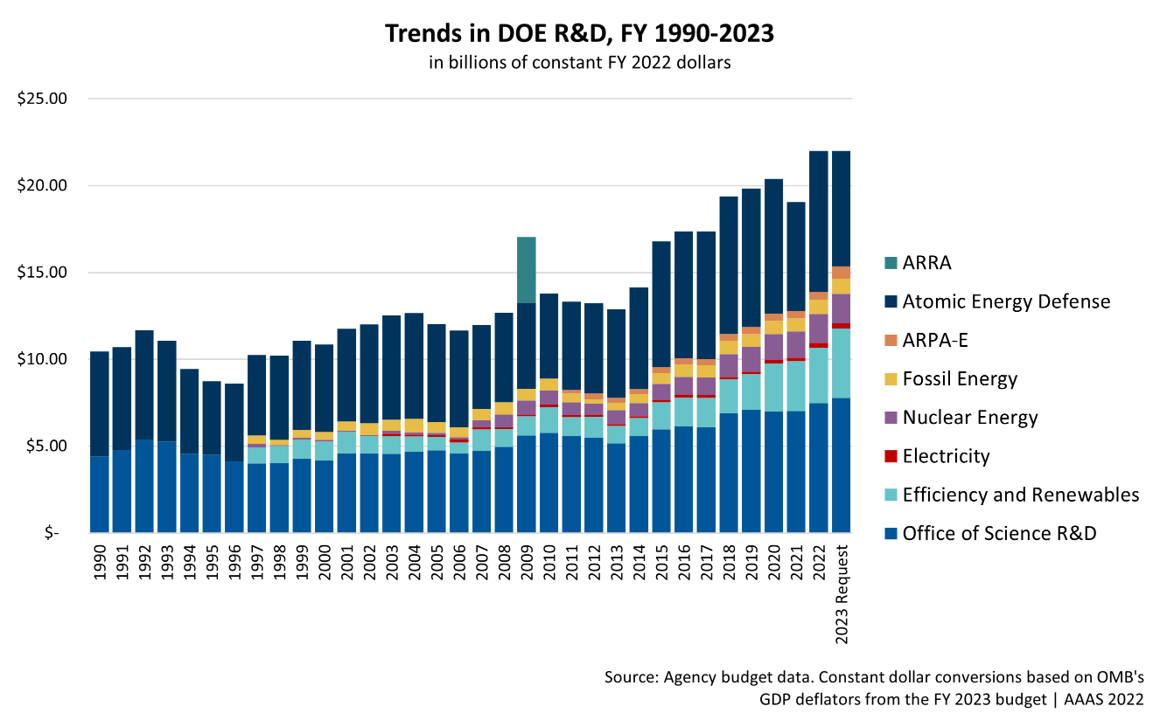
DOE is also home to 17 national labs around the country.
DOE is focused on the science, technology, and policy dimensions of energy and not on the federal government’s oversight and management of energy resources. In that role, having a climate pragmatist and energy realist as DOE secretary will serve the agency and the nation well.
Rather than call Chris Wright silly juvenile names, the climate community should offer to work with Wright to help deliver — in his words — “massive improvements in energy technologies that can deliver low-carbon energy that is also low cost, reliable and secure.” That is a goal we all should support.
Bonus! Here is a video of me and Chris Wright talking energy and climate just over a year ago (for those who prefer to read, a transcript can be found here):
I welcome your comments, critique, and conversation. If you are new here, welcome, please check out the THB About page. Reminder: paid subscribers have access to all the goodies available at the THB Pro page. Please consider joining the community as a paid subscriber to support my work and join the conversations!
I know Chris and have had the chance to talk with him in depth about climate and energy.
Writing in the Financial Times over the weekend, Janan Ganesh argued that American “Liberals have evolved a language of their own. Or at least a dialect. Those who speak it tend to have no earthly idea how odd it sounds to others, and therefore what a competitive disadvantage it is versus the plain-speaking right.” I thought of this when I saw the phrase “climate crisis denier” in The Washington Post. Normal people probably won’t understand such a bizarre epithet, which is in-group code for a tiny sliver of the population.




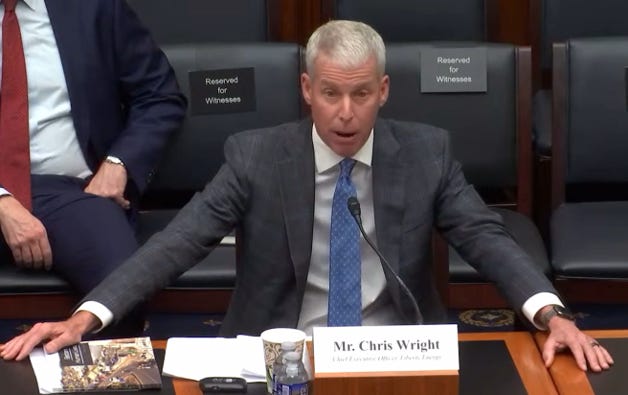
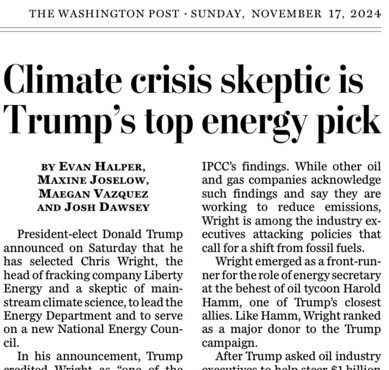
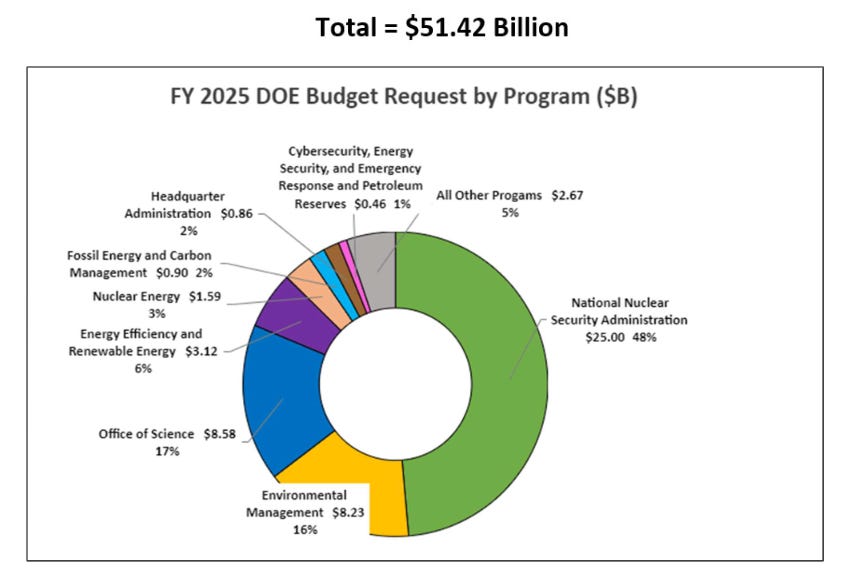
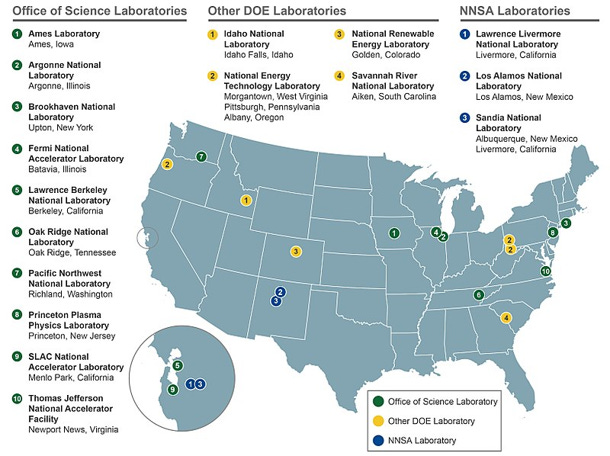
Oh my goodness! He is a climate crisis skeptic who doubts that we are all about to die from the imminent crisis that we have heard about endlessly for the last 30+ years! What on Earth shall we do?
From what I know, Mr. Wright is the best of Trump's nominees to date. For this new role, he is indeed Mr. Right.
Thank you for this timely post and disarming the climate community before they can mount any kind of attack. It won’t be pretty when it happens.
As is my custom, I have a question. About midway through the piece, you quote Mr. Wright as saying that two things are “required for positive progress on climate change.” By what metrics can we measure “progress on climate change?” What is progress, in this case? Decarbonization? Stable temperatures? Stable CO2 readings?
A fun metric might be, how many apologies can we get from Michael Mann, John Podesta, and Al Gore? “Gee, we were wrong.” Yeah…not happening.
But seriously sir, what constructs are needed to measure (meaningfully) what is essentially a geologic process. Yes, humankind might be messing with the trajectory, but is it possible to detect the contribution of man’s work to the change in slope of that trajectory? Especially given the geologic time frames involved, the extent of the earth’s surface, and the fluid dynamics (PDEs?) of the oceans? “Progress” implies a beginning and an end. Is the goal of progress to restore the climate to pre-industrial conditions? That would seem to be the goal of nut-zero [sic]. Is the goal of progress to improve man’s relationship with his climate by continuing to improve his means of adapting to changes as they occur? How do you measure that? Life expectancy comes to mind, as do various metrics comparing to GDP (energy per person per GDP, e.g). What end do we seek? Please, don't say "get re-elected."
Mr. Wright is the shining star of Mr. Trump’s cabinet picks, and I’m certain we’ll see many changes, some subtle and some not so much, in energy policy in the US. From his book, “Bettering Human Lives,” the most politically charged statement is “Zero Energy Poverty by 2050 is a superior goal compared to Net Zero 2050.” The numbers in the US, 1 in 4 living in energy poverty, are embarrassing. Globally, over one-third of the world lives without clean cooking fuel. Zero energy poverty is a helluva lot better goal than nut-zero! At least, one can find measurable metrics.
Two posts I would like to see from you, sir. First, a two- or three-part series on “measuring progress” in climate change. Second, a post on energy poverty in the US. A third post, perhaps from EBB, Doomberg, GLF or PER, or Jim Conca, might be how energy poverty distorts the death ratio of fossil fuels. What portion of the death print from coal, oil, and gas are due to indoor pollution? Certainly, biomass could be curtailed, but that’s for another day.
Thank you again for you wonderful work and diligent efforts to keep the conversation honest!